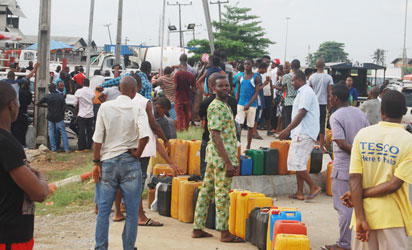
Nigeria: Fuel scarcity hits Christmas celebrations
This year’s Christmas celebrations for many Nigerians may not enjoy the trappings of excitement and joy of old, as a cocktail of socio-economic challenges continues to afflict them into tomorrow’s Yuletide.
Advertisement
Starting with the now familiar but depressing power outage which leaves many homes in darkness, the sudden scarcity of Premium Motor Spirit, PMS (popularly called petrol), which many use to power their generating sets has created its own discount for that option. Worse, Lagosians and many other city dwellers woke up yesterday to very long queues at ATMs.
While some had thought that the none-availability of cash from the machines was an individual challenge, others had queued in vain only to later discover that the machines didn’t have cash to dispense.
The shortage of funds has, all the more, made it difficult, if not impossible, for many to be able to afford to patronise the black market dealers for petrol. With banks to resume banking-hall business on Wednesday, many may have to spend the Christmas without available funds.
Power outage, shortage or total scarcity of petrol and paucity of funds to celebrate the Xmas creates an outcome that would be very bleak for many. Frustrated intending travellers were yesterday seen at motor parks in some parts of the country lamenting the high cost of transportation.
As a consequence, the struggle to get petrol at all cost by car owners continue to create gridlocks across the country.
In Abuja, Kaduna, Benin, Enugu and Lagos, roads where gas stations sell petrol are always in lockdown mode, further worsening the already bad situation. Why petrol shortage may persists into Q1, Sunday Vanguard investigation over the weekend showed that Nigeria’s four refineries with capacity to refine 445,000 barrels per day have not shown any improvement to enable the nation refine much of its crude oil locally. Consequently, a bulk of the nation’s fuel is still imported from the global market at higher cost to the nation that struggles to construct its post-recession economy.
In its September, 2017 report obtained by Sunday Vanguard which is the most current, the Nigerian National Petroleum Corporation, NNPC stated that: "Utilisation of crude oil for domestic product supply in August 2017, NNPC lifted 9,706,674 barrels of crude oil for domestic utilisation translating to an average volume of 313,118.52 barrels of oil per day in terms of performance.
"In order to meet domestic product supply requirement for the month of August 2017 about 8,486,673 barrels was processed under the Direct-Sales-Direct Purchase (DSDP) scheme and the balance of 1,220,001 barrels was delivered to the domestic refineries for processing."
Sunday Vanguard’s investigation showed that the poor state of domestic refineries is worsened by limited importation and poor state of many NNPC depots and pipelines which affect seamless distribution of fuel nationwide. These, it was gathered, have compelled many operators to come from all parts of the nation to lift with tankers from Lagos.
A visit to Apapa and its environs showed that the very slow lifting of petrol from private facilities where NNPC imports are stored has culminated in traffic problems, thus making tanker drivers to spend several weeks before lifting the product.
The dependence on importation and the inadequate supply only signposts the reality that the situation would linger into the first quarter of next year. Hoarding, smuggling, others Apparently aware of the sad situation, it was also gathered that some filling stations have started hoarding the product because they are not sure of when their drivers would return with fuel.
In fact, it was reliably learnt that the storage tanks at filling stations would have been emptied before their return following the high demand for fuel in many parts of the nation, especially during this festive period which calls for massive movement of goods and persons from one part of Nigeria to another.
The situation is worsened by sharp practices, including hawking of the product in jerry cans, diversion to illegal outlets and smuggling.
A visit to Idi Iroko, a border town in Ogun State, showed that fuel smuggling has once again become a brisk business in Nigeria. Sunday Vanguard learnt that dealers who bring the product, including stolen fuel from the Niger Delta, have wholesalers in the area as trading partners who take delivery before selling it to retailers and smugglers that take it across the borders, creeks, using boats and canoes to other West African countries.
Credit: Vanguard Nigeria




